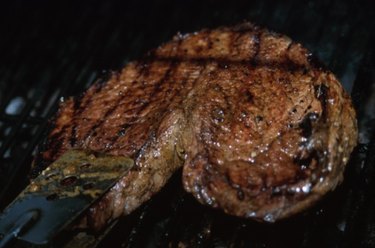
Arginine and carnitine are amino acids that are found together in nearly every protein source you eat. Beef, chicken, and even tofu contain both amino acids. Your body breaks down amino acids and uses them on an as-needed basis. Amino acids that do not get used immediately either get excreted or converted to sugar for use as energy. Consult a health care professional before using any dietary supplement.
Arginine
Video of the Day
Arginine, an amino acid that may be somewhat essential in infants, is generally produced in sufficient quantity in your body. Arginine is synthesized from the amino acid citrulline. Arginine is found in all dairy sources, animal products, wheat germ, oatmeal and nuts, while cirtulline is found in many fruits. Citrulline is also synthesized from yet another amino acid. Given the vast array of sources for arginine, and your ability to synthesize even more, arginine deficiencies are extremely rare.
Video of the Day
Role of Arginine
Arginine may increase the level of growth hormone within your body. Growth hormone helps build muscle, burn fat and maintain the health of your skin and bones. This claim is made based upon the use of arginine in a growth hormone stimulation test, but this occurs only under laboratory conditions. While a 1988 study published in "The Journal of Clinical Endocrinology and Metabolism" showed a slight elevation in growth hormone levels, there is no evidence to support the efficacy of arginine as a growth hormone supplement.
Carnitine
Carnitine is another amino acid that your body synthesizes, in this case from the amino acids lysine and methionine. Carnitine is used in your body to assist with energy production and regulation with your cells. While this function is critical, you synthesize enough that you are rarely in danger of low energy levels due to carnitine deficiency. If you are worried about your carnitine levels, carnitine is found in quantity in red meat, eggs, pork and dairy.
Use of Carnitine
Carnitine is sold as a nutritional supplement to assist with many functions in your body, including fat loss. In a 2004 study published in the "Annals of Nutrition and Metabolism," supplementation of carnitine showed no increases in fat loss. A review of the literature published in the "Canadian Journal of Applied Physiology" showed that while carnitine may increase fat oxidation within your cells, it does not promote fat loss in humans.
- "The Journal of Clinical Endocrinology and Metabolism"; Arginine Stimulates Growth Hormone Secretion by Suppressing Endogenous Somatostatin Secretion; J. Alba-Roth, et al.; December 1988
- "Molecular Aspects of Medicine"; Carnitine: a Nutritional, Biosynthetic, and Functional Perspective; A. Steiber, et al.; October - December 2004
- "Annals of Nutrition and Metabolism"; Carnitine Supplementation Fails to Maximize Fat Mass Loss Induced by Endurance Training in Rats; M. Saldanha Aoki, et al.; February 2004
- "Canadian Journal of Applied Physiology"; Dietary Fat Intake, Supplements, and Weight Loss; D.J. Dyck; December 2000